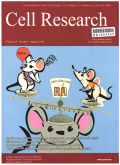- 钛学术文献服务平台 \
- 学术期刊 \
- 基础科学期刊 \
- 生物科学期刊 \
- 细胞研究(英文版)期刊 \
null
Calcium channel blockers reduce severe fever with thrombocytopenia syndrome virus (SFTSV) related fatality
基本信息来源于合作网站,原文需代理用户跳转至来源网站获取
摘要:
Severe fever with thrombocytopenia syndrome (SFTS),an emerging tick-borne infectious disease caused by a novel phlebovirus (SFTS virus,SFTSV),was listed among the top 10 priority infectious diseases by the World Health Organization due to its high fatality of 12%-50% and possibility of pandemic transmission.Currently,effective anti-SFTSV intervention remains unavailable.Here,by screening a library of FDA-approved drugs,we found that benidipine hydrochloride,a calcium channel blocker (CCB),inhibited SFTSV replication in vitro.Benidipine hydrochloride was revealed to inhibit virus infection through impairing virus internalization and genome replication.Further experiments showed that a broad panel of CCBs,including nifedipine,inhibited SFTSV infection.The anti-SFTSV effect of these two CCBs was further analyzed in a humanized mouse model in which CCB treatment resulted in reduced viral load and decreased fatality rate.Importantly,by performing a retrospective clinical investigation on a large cohort of 2087 SFTS patients,we revealed that nifedipine administration enhanced virus clearance,improved clinical recovery,and remarkably reduced the case fatality rate by >S-fold.These findings are highly valuable for developing potential host-oriented therapeutics for SFTS and other lethal acute viral infections known to be inhibited by CCBs in vitro.

推荐文章
期刊_丙丁烷TDLAS测量系统的吸收峰自动检测
带间级联激光器
调谐半导体激光吸收光谱
雾剂检漏 中红外吸收峰 洛伦兹光谱线型
不同盐度、温度及光照对漂浮浒苔生理生态的影响
浒苔
盐度
温度
光照
生理生态
期刊_联合空间信息的改进低秩稀疏矩阵分解的高光谱异常目标检测
高光谱图像
异常目标检测 低秩稀疏矩阵分解 稀疏矩阵 残差矩阵
内容分析
关键词云
关键词热度
相关文献总数
(/次)
(/年)
引文网络
引文网络
二级参考文献 (53)
共引文献 (21)
参考文献 (42)
节点文献
引证文献 (0)
同被引文献 (0)
二级引证文献 (0)
1982(1)
- 参考文献(0)
- 二级参考文献(1)
1988(1)
- 参考文献(0)
- 二级参考文献(1)
1993(1)
- 参考文献(1)
- 二级参考文献(0)
1999(1)
- 参考文献(1)
- 二级参考文献(0)
2000(1)
- 参考文献(0)
- 二级参考文献(1)
2001(2)
- 参考文献(0)
- 二级参考文献(2)
2002(5)
- 参考文献(1)
- 二级参考文献(4)
2003(3)
- 参考文献(1)
- 二级参考文献(2)
2004(3)
- 参考文献(1)
- 二级参考文献(2)
2005(4)
- 参考文献(1)
- 二级参考文献(3)
2006(4)
- 参考文献(2)
- 二级参考文献(2)
2007(7)
- 参考文献(3)
- 二级参考文献(4)
2008(4)
- 参考文献(0)
- 二级参考文献(4)
2009(3)
- 参考文献(1)
- 二级参考文献(2)
2010(7)
- 参考文献(1)
- 二级参考文献(6)
2011(6)
- 参考文献(2)
- 二级参考文献(4)
2012(9)
- 参考文献(4)
- 二级参考文献(5)
2013(5)
- 参考文献(2)
- 二级参考文献(3)
2014(8)
- 参考文献(4)
- 二级参考文献(4)
2015(4)
- 参考文献(3)
- 二级参考文献(1)
2016(7)
- 参考文献(5)
- 二级参考文献(2)
2017(5)
- 参考文献(5)
- 二级参考文献(0)
2018(3)
- 参考文献(3)
- 二级参考文献(0)
2019(1)
- 参考文献(1)
- 二级参考文献(0)
2019(1)
- 参考文献(1)
- 二级参考文献(0)
- 引证文献(0)
- 二级引证文献(0)
引文网络交叉学科
相关学者/机构
期刊影响力
细胞研究(英文版)
主办单位:
中国科学院上海生化细胞所
出版周期:
月刊
ISSN:
1001-0602
CN:
31-1568/Q
开本:
16开
出版地:
上海岳阳路319号中科院上海生命科学研究院31B,401室
邮发代号:
4-645
创刊时间:
1990
语种:
eng
出版文献量(篇)
2692
总下载数(次)
0
期刊文献
相关文献
推荐文献
- 期刊分类
- 期刊(年)
- 期刊(期)
- 期刊推荐
力学
化学
地球物理学
地质学
基础科学综合
大学学报
天文学
天文学、地球科学
数学
气象学
海洋学
物理学
生物学
生物科学
自然地理学和测绘学
自然科学总论
自然科学理论与方法
资源科学
非线性科学与系统科学
细胞研究(英文版)2022
细胞研究(英文版)2021
细胞研究(英文版)2020
细胞研究(英文版)2019
细胞研究(英文版)2018
细胞研究(英文版)2017
细胞研究(英文版)2016
细胞研究(英文版)2015
细胞研究(英文版)2014
细胞研究(英文版)2013
细胞研究(英文版)2012
细胞研究(英文版)2011
细胞研究(英文版)2010
细胞研究(英文版)2009
细胞研究(英文版)2008
细胞研究(英文版)2007
细胞研究(英文版)2006
细胞研究(英文版)2005
细胞研究(英文版)2004
细胞研究(英文版)2003
细胞研究(英文版)2002
细胞研究(英文版)2001
细胞研究(英文版)2000
细胞研究(英文版)2019年第9期
细胞研究(英文版)2019年第8期
细胞研究(英文版)2019年第7期
细胞研究(英文版)2019年第6期
细胞研究(英文版)2019年第5期
细胞研究(英文版)2019年第4期
细胞研究(英文版)2019年第2期
细胞研究(英文版)2019年第12期
细胞研究(英文版)2019年第11期
细胞研究(英文版)2019年第10期
细胞研究(英文版)2019年第1期

 免费查重
免费查重










